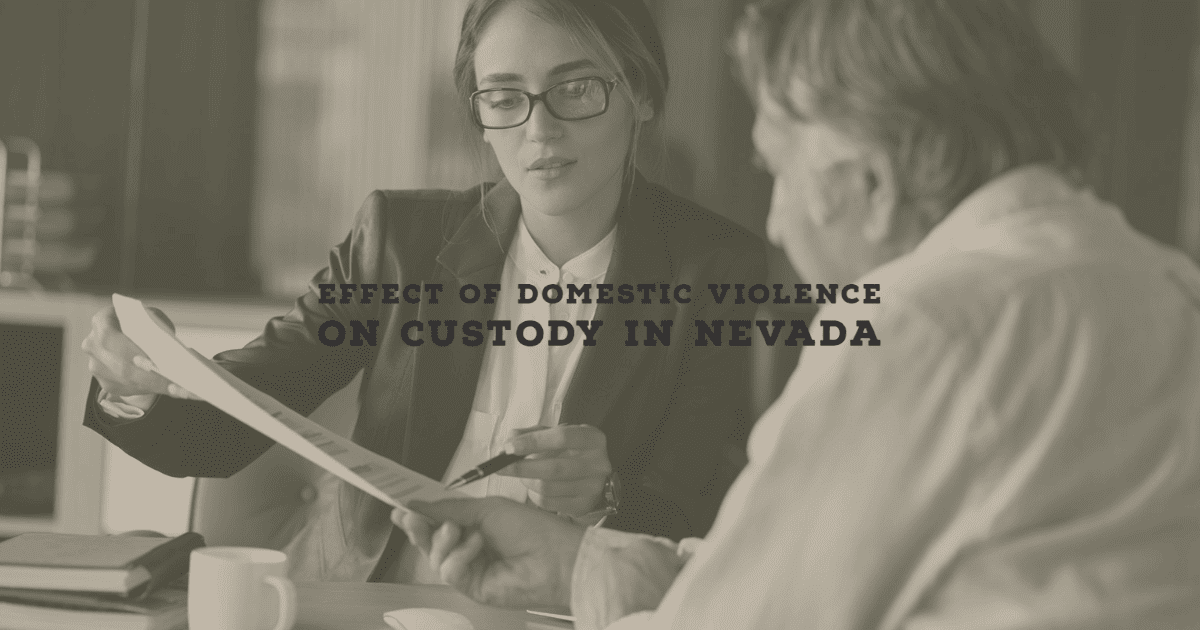Domestic violence has devastating effects on you and your family. It can affect your job, reputation, and personal life. Domestic violence also has an effect when it comes to child custody decisions.
Domestic violence has a significant effect on custody hearings in Nevada. It is possible that you can lose custody of your children with a domestic violence charge, especially if it’s a physical violence crime.
If you are facing domestic violence charges and have children, you need to seek the help of an attorney. The team at Rosenblum Allen Law Firm can help you navigate the legal process and help you keep your kids.
What follows is a brief explanation of the effects of domestic violence on custody in Nevada.

How Does Nevada Law Define Domestic Violence?
Domestic violence is any type of violence that occurs in the home. This can include physical, emotional, verbal, and sexual abuse. It can also include stalking or attempting to manipulate someone for personal gain. Domestic violence can also involve cyberstalking or online harassment.
Domestic violence is not only between spouses. It can include anyone living in the home. This includes children. Domestic violence is categorized as assault and battery under Nevada law.
Domestic Abuse and Child Custody
Custody takes two primary forms: legal and physical. Legal custody means the parent has a say in the child’s health and education. Physical custody pertains to where the child lives and care of basic needs like food and shelter.
The law takes domestic abuse into account when determining child custody. The judge will consider several factors to determine what is in the child’s best interest.
Two factors that are directly tied to domestic violence are:
- A history of parental neglect of the child or siblings
- If either parent has committed domestic violence on anyone living in the home.
The judge will examine the evidence to determine if domestic violence occurred. This is called an “evidentiary hearing.” No jury is involved in this hearing, as the judge only looks at the evidence. They will then determine if domestic violence occurred.
The accused parent will likely not get custody or will have limited custody. The judge may decide it is not in the child’s best interest to be around their abuser.
The judge will provide a written order with an explanation of their decision. The judge’s main priority will be protecting the child, victim’s parent, or other abuse victims.

Impact on Visitation
In routine custody decisions, each parent is awarded visitation rights. These rights differ with each case and family dynamic. When there are accusations of domestic violence, it can significantly affect visitation.
The court might order:
- A ban on overnight visitation
- Supervised visitation, with all costs paid by the abuser
- The abusive parent must complete certain classes. This includes anger management, parenting classes, and domestic violence classes. If applicable, they may need to attend drug and alcohol counseling. They may also have to attend therapy
- Visitations occur in a safe, neutral location such as a fire department or police station.
- Prohibiting the use of drugs or alcohol before or during visitation
- Any other conditions that ensure everyone’s safety
If the judge places any restrictions on visitation, you must follow the judge’s orders. There is the possibility that some limits can be lifted at a later date.
Termination of Parental Rights
Ideally, the court wants both parents involved in their child’s life. The abusing parent may regain or keep rights if they follow specific guidelines.
However, in some extreme cases, a parent can receive a termination of parental rights (TPR). There are several situations in which a parent can lose their parental rights.
These include:
- Abandonment
- Neglect
- Become unfit to provide care
- Caused severe physical, mental, or emotional abuse
- Judges only use TPR in the most extreme cases. Such rulings are permanent. This means that if a TPR order is issued, you will not be able to regain your parental rights.
Legal Assistance
You need to seek an attorney if you are in a custody dispute where domestic violence is a factor. They will be able to defend your case and help you keep the physical custody of your children. They may be able to work out a deal where you can regain rights if your parental rights are limited.
Our legal team is skilled in domestic violence and family court cases. They can help you choose the right course of action. You have rights as a parent, and they will help you to keep those rights.

Frequently Asked Questions
How is domestic violence defined under Nevada law?
Domestic violence is any form of violence that occurs within the home. This includes physical, emotional, verbal, and sexual abuse and extends to cyberstalking or online harassment. The definition is not limited to spousal relationships and can involve any household member, including children. It is categorized as assault and battery under Nevada law.
What is the impact of domestic violence on child custody decisions?
In Nevada, domestic violence significantly affects child custody decisions. Two critical factors tied to domestic violence are parental neglect and whether either parent has committed domestic violence against anyone living in the home. The judge will consider these factors and others to determine what is in the child’s best interest. The accused parent could lose or have limited custody.
How does domestic violence affect visitation rights?
Domestic violence can significantly affect visitation rights. The court may impose several restrictions, such as prohibiting overnight visitation, mandating supervised visitation, requiring the abusive parent to complete certain classes or counseling, setting visitation at a safe, neutral location, and prohibiting using drugs or alcohol before or during visitation.
Can a parent lose their parental rights due to domestic violence?
In extreme cases, a parent can lose their parental rights due to domestic violence. This is referred to as termination of parental rights (TPR), and it can occur due to abandonment, neglect, unfitness to provide care, or severe physical, mental, or emotional abuse. TPR rulings are permanent, meaning parental rights cannot be regained.
How can a defense attorney help in such cases?
An attorney can provide essential legal assistance in a custody dispute where domestic violence is a factor. They can help defend your case and assist in maintaining or regaining your parental rights. They are experienced in navigating the legal system and can advise on the best action to protect your parental rights.
Where can I find more information on this topic?
You can refer to posts such as “Understanding Domestic Violence in Nevada,” “Restoring Gun Rights After Domestic Violence,” “Domestic Violence Plea Bargain in Nevada: Get the Facts,” and many others listed under the “Further Reading” section of the main article. These posts provide valuable information on child custody, domestic violence, and related legal aspects.
Why should I hire a Las Vegas Domestic Violence Defense Attorney?
Hiring a defense attorney specializing in domestic violence can significantly improve your chances of successfully navigating the legal process. They can protect your rights, formulate a strong defense, and ensure you are adequately represented in court. View the short video to understand the importance of hiring a defense attorney in such cases.

Glossary
Domestic Violence
A form of abuse that occurs within a domestic setting, such as a marriage or cohabitation. It includes physical, emotional, verbal, and sexual abuse and stalking or online harassment.
Child Custody
A legal term referring to the parent’s or guardian’s rights and responsibilities towards their child, including making decisions about their child’s upbringing, education, and healthcare.
Legal Custody
A type of child custody that gives a parent the right to make long-term decisions about the child’s welfare, education, healthcare, and religious upbringing.
Physical Custody
Another type of child custody determines where the child will live and who is responsible for the child’s basic needs, like food and shelter.
Visitation Rights
The legal rights awarded to the non-custodial parent to spend time with their child after a separation or divorce.
Evidentiary Hearing
A judicial proceeding is where the facts of a case are examined, evidence is introduced, and witnesses are heard, typically before a judge.
Termination of Parental Rights (TPR)
A court order that permanently ends all legal, social, and financial responsibility between the child and the parent. In cases of domestic violence, this can be the outcome if the court determines that the parent is unfit.
Restraining Order
A legal order issued by a court to protect a person from another person’s harassment or violence.
Parenting Classes
Classes that provide education and practical advice to parents to help them deal with issues related to raising children.
Defense Attorney
A lawyer who represents the defendant in legal proceedings, helping them navigate the legal system and formulating a defense strategy to protect their rights.
Las Vegas Domestic Violence Defense Attorney
An attorney based in Las Vegas who offers defense services to individuals charged with domestic violence. They provide legal advice and representation to help clients navigate the legal process and protect their rights.

More Resources for You
For those seeking guidance and support in various aspects of family law in Las Vegas, our lead attorney, Molly Rosenblum Allen, Esq., has developed extensive resources to assist you during challenging times. Below is a list of valuable resources that cover a broad range of topics related to custody and family law issues:
Las Vegas Custody Attorney: For comprehensive support in child custody matters, visit here.
Father’s Rights: Dedicated to advocating for fathers’ rights, this resource ensures you’re well-informed. Find out more here.
Supervised Visitation: If you’re facing challenges with supervised visitation, get the necessary information here.
Changing Custody Agreement: Discover the steps and considerations for modifying your custody agreement by clicking here.
Grandparents Rights Nevada: Grandparents seeking to understand their legal rights can find detailed insights here.
Long Distance Co-Parenting: For parents navigating the complexities of co-parenting from a distance, guidance is available here.
How a Mother Can Lose a Custody Battle: Mothers concerned about custody disputes can learn more about potential pitfalls here.
Custody Battle Tips for Nevadans: Nevadans engaged in a custody battle can find strategic advice here.
What Not To Say In Child Custody Mediation: Navigate your mediation process more effectively by understanding what to avoid saying, details provided here.
How Much is a Custody Lawyer: If you’re concerned about legal costs, find out more about the expenses associated with hiring a custody lawyer here.
Types of Custody: Clarify the different types of custody to understand which situation applies to you by visiting here.
At What Age Can a Child Decide to Stop Visitation: Learn about the age at which a child can legally make decisions regarding visitation here.
Each of these resources is tailored to provide you with the knowledge and support you need to navigate your legal journey effectively. Whether you are dealing with custody concerns, parental rights, or other family law matters, these resources can serve as a starting point to understanding your rights and the legal processes involved.

Offsite Resources You May Find Helpful
Here are seven offsite resources that provide information about the impact of domestic violence on child custody cases, specifically as it pertains to Nevada:
Nevada State Bar: The official site of the Nevada State Bar, providing resources about various legal topics including child custody and domestic violence.
Nolo: This site offers a wealth of legal information for consumers and small businesses, including details on child custody and domestic violence.
FindLaw: An online resource providing free legal information and a directory of lawyers, including a section dedicated to child custody and domestic violence.
LegalZoom: An online legal technology company providing legal information and services to consumers and small businesses, including child custody and domestic violence.
American Bar Association: The ABA provides resources on a variety of legal topics, including child custody and domestic violence.
Justia: A platform that provides free legal information and a directory of attorneys for various legal issues, including child custody and domestic violence.
National Council of Juvenile and Family Court Judges: This Reno, Nevada-based organization provides information related to juvenile and family law, including domestic violence and child custody issues.
Why You Still Haven't Hired a Las Vegas Domestic Violence Defense Attorney Yet
Watch this short video to take the next big step toward defending your rights against your domestic violence charge.
The Reason You Haven't Hired A Child Custody Attorney Yet
We’re ready to fight for the rights of your family if you hire us. We’re waiting to jump into action on the behalf of your family.

A Special Message from Our Lead Attorney

Molly Rosenblum, Esq.
Dear Reader,
I extend my deepest thanks for taking the time to explore these resources.
Knowledge is a powerful tool, and understanding the complexities of custody battles, mediation, and child support can provide a solid foundation as you navigate these challenging circumstances.
Every situation is unique, with its intricacies and nuances, and my team and I at The Rosenblum Allen Law Firm are here to guide you through every step of the way.
We bring our passion, expertise, and dedication to every case, striving to achieve our clients’ best possible outcome.
Should you need further advice and assistance, please get in touch with us at (702) 433-2889.
We’re here to help you get the ball rolling on your situation.
Please note that while we typically do not offer free consultations, we do make exceptions for cases involving domestic violence charges.
We understand the urgent nature of these situations and believe in providing support and guidance to those most in need.
Again, thank you for your time, and remember, we’re just a phone call away.
Best regards,
Molly Rosenblum, Esq.





